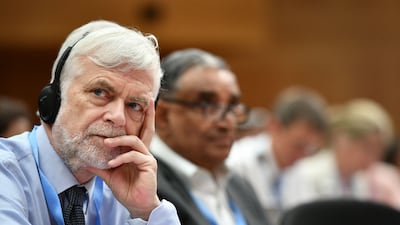British scientist Jim Skea was elected on Wednesday as head of the UN expert panel that advises governments on climate change.
Prof Skea, 69, won a vote in Kenya to lead the body whose seminal climate reports lay bare the challenge facing humanity.
A scientist at Imperial College London, he campaigned on a platform of inclusion and diversity in the Intergovernmental Panel on Climate Change's work.
He said he was “humbled and deeply honoured” to be elected IPCC chairman, succeeding South Korean Prof Hoesung Lee.
“I will address three priorities: ensuring inclusive participation and collaboration across all regions, promoting the use of the best and most relevant science, and maximising the reach and impact of the IPCC's work through engagement with policymakers and other stakeholders,” he said.
“We have the tools, now we need to put them to work.”
The UK government had lobbied for Prof Skea's election, after he previously chaired an IPCC working group focusing on measures to tackle climate change. Foreign Office minister Lord Ahmad called the result “excellent news”.
The panel has said that deep emissions cuts are needed this decade if humanity is to limit global warming to 1.5°C, the goal of the Paris Agreement.
Speaking to The National last month, Prof Skea said humanity would enter a “new kind of world” if temperatures rise by more than 3°C, the trajectory the IPCC says the world is on under current policies.
He said negotiations at Cop28 in Dubai would be “absolutely critical if we're going to move things forward”.
Prof Skea won a run-off by 90 votes to 69 against Brazilian scientist Thelma Krug. Debra Roberts of South Africa and Jean-Pascal van Ypersele of Belgium were the other candidates.
He takes charge as the IPCC begins its next round of work to distill the sum of human knowledge on climate change into reports that guide policymakers. Forecasts by the panel on temperatures and extreme weather are often quoted by presidents, prime ministers and the UN's top brass.
A sixth round of IPCC reports was completed this year in time for the UAE's presidency of Cop28 to oversee a first ever “global stocktake” of progress towards the Paris goal.

Tasneem Essop, the executive director of lobby group Climate Action International, said Prof Skea was taking on a “critical role” in the shadow of dramatic summer heatwaves and wildfires.
“The role of scientists in this global crisis now surpasses the conventional confines of research and analysis,” she said.
“They are being called upon to serve as forceful advocates for practical solutions, actively championing measures based on equity and justice that will effectively tackle the escalating climate change crisis.”
The most recent IPCC report in March said it was unequivocal that humans had already caused about 1.1°C of global warming and billions of the world’s people were “highly vulnerable” from climate change.
But talks in Switzerland on finalising the report overran for two days and some delegates from developing countries had to go home on fixed-price air fares, Prof Skea said during a UN event in Germany last month. He said the IPCC should “draw on the widest range of people” for its work.
Petteri Taalas, the secretary general of the World Meterological Organisation, said the wildfires playing out on TV screens showed that climate action was “gaining in urgency on a monthly – even daily – basis”. He said the body “looks forward to working with Prof Skea to tackle the greatest challenge facing our planet”.


